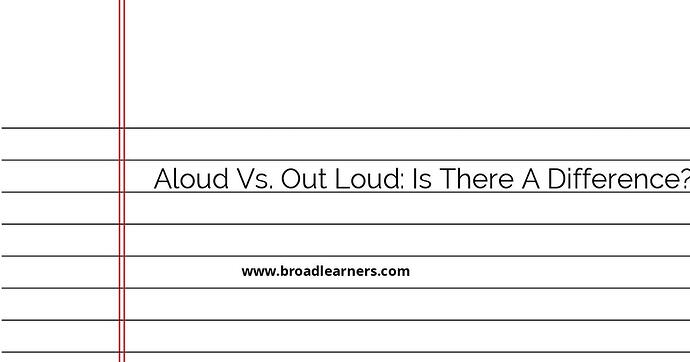In the realm of English grammar, the terms "aloud" and "out loud" are often used interchangeably. However, they each carry distinct connotations and usage nuances. This article endeavors to elucidate the differences between "aloud" and "out loud" to enhance your linguistic proficiency.
- Definition and Usage of "Aloud":
The term "aloud" refers to speaking in a vocal and audible manner. It is used when someone is reading or expressing thoughts so they can be heard distinctly by others. "Aloud" often conveys a more formal tone.
Example:
"She read the poem aloud to the entire class."
In this instance, "aloud" signals that the poem was read in a clear voice, suitable for the audience to hear.
- Definition and Usage of "Out Loud":
By contrast, "out loud" is commonly used in informal contexts and often implies a sudden or unplanned vocalization. It is associated with saying something in a manner that is easily heard, typically with an emphasis on the volume rather than the formality of the situation.
Example:
"He burst out laughing out loud at the joke."
Here, "out loud" emphasizes the spontaneous and audible nature of the laughter in a more casual context.
To further delineate their differences, let us explore some alternative sentences:
- Reading a Text:
- "She decided to read the book aloud, allowing everyone to follow the story."
- "He exclaimed the surprising news out loud, drawing attention from the people around."
- Expressing a Thought:
- "He thought about the answer and then said it aloud for the group to hear."
- "Without realizing it, she voiced her thoughts out loud, much to her own surprise."
Both "aloud" and "out loud" can be used effectively in various contexts, but selecting the appropriate term can enhance the intended tone and clarity of your communication. In more formal settings, "aloud" may be preferred for its conventional tone. Conversely, "out loud" may suit casual interactions due to its informal and spontaneous nature.
By understanding and appropriately applying these terms, you can enrich your expressive capabilities in both formal and informal contexts. Remember to consider the setting and potential audience to select the term that most accurately conveys your intended meaning.
Did I miss anything? Respond below
